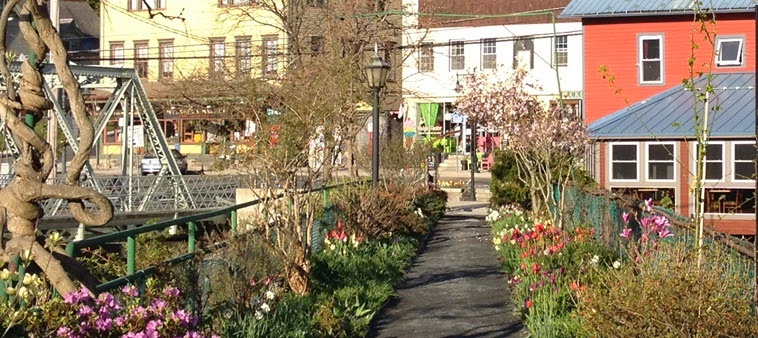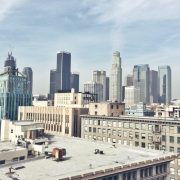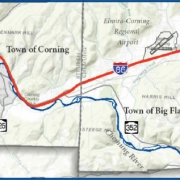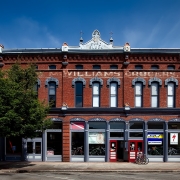There’s a revolution underway in economic development across the USA. Inching its way out is the traditional real estate-focused approach to economic development and some of the $80 billion in tax breaks (NY Times, December 1, 2012) and other incentives state and local governments offer to attract new businesses and jobs.
Enter stage left are new partners in economic development, a grass-roots assortment that includes libraries, community organizers, special interest foundations, teenage app developers, Big Picture schools, churches or sustainable energy entrepreneurs.
We explored how communities might partner with such organizations/people at the Build North East conference in Worcester (September 7-9, 2014). Robert Leaver of New Commons Rhode Island and John Findlay, Maverick & Boutique conducted rapid-fire 5 X 5 workshop to:
- Identify opportunities for partnering with strategically positioned community organizations such as libraries, leading edge schools and colleges
- Explore how to expand social and business entrepreneurial activities at a grass-roots level, especially in urban and rural settings
- Plan the start-up of public access making/manufacturing, design publishing, app development in the center of a village or town
Six teams began by identifying a village or town in New England that was experiencing an intractable economic/community development problem.
- Good New England Bones
- OK for 6 months of year
- Struggles economically during Winter
- Youth unemployment, drug epidemic
- Can’t get critical skills
- Good in parts – has sprawl, some blight, brownfields (costly to remediate)
- “Poverty in paradise”
Each team chose one of six PARTNERS to work with, for which a profile had been developed. Here are the profiles:
Libraries: are adopting new “wise application of knowledge” roles in a rapidly changing and more complex world. They provide a local high touch experience for the high tech world we live in. Their new roles in economic development include:
- Maker spaces – 3D printers, electronic and electrical, publishing equipment
- Public access to the Internet, computers
- Lend books, CDs, software, equipment,
- Meeting rooms and meeting facilitation
- Incubator spaces
- Courses for completing K-12
- Support for college study and research
- Research for new businesses
- New skills – software, webpage, databases
Public access manufacturing/makerspaces: Cooperatives and companies such as TechShop are establishing manufacturing and production facilities for the public to rent/use by the day, week or month. Their new roles in economic development include:
- Time share equipment use
- Basic training, On-site instruction and college courses
- Metalworking – mills, lathes, routers, plasma cutters, 3D printers
- Culinary – shared commercial kitchens, Many kinds – metal working,g rooms Agricultural – equipment for bottling/canning, fermented products – wine, beer, cheese and yoghurt production
- Arts and Artisan – woodworking, framing, showrooms etc.
Big Picture Schools: Personalized learning one student at a time. Big Pictures Schools prepare students for the real world, with applied as well as soft skills – leadership, project management, mentoring and planning – rarely found in “curriculum driven” schools. Their roles in economic development include:
- Students complete an authentic project connected to their interest
- Students learn how to be adults by being with adults
- Mentors are expert in the field of student’s interest and in their field
- Assessed by growth and change, not tests; family involved
- Project based – portfolios, exhibitions, reflective journalling
- Small group learning, maximum of 150 people per school
- Learning by serving the community via projects
Churches: As community and economic development are increasingly inseparable. Faith-based organizations, which have a long history of education, health care and support service delivery have a critical role to play, including personalisation – reversing the trend to corporatisation and large scale service delivery. Their roles in economic development include:
- Education and health care service delivery
- Support for those who have fallen on hard times
- Aged, children’s, and rehabilitation services
- Fostering a sense of community
- Drug dependence and recovery services
A gaggle of 14 year old app developers: Who knew? Many of the next generation of Tech Millionaires are starting their businesses on-line before they are old enough to drink or drive. They are developing phone and tablet apps that operate at between current paradigms and disciplines. Their new roles in economic development include:
- Capable of building new applications in a few weeks.
- Low-cost business models
- Solve customized local business and community problems
- Connected to the world and other developers
- Entrepreneurial – regard work as projects rather than careers
- Low barrier to market entry
Sustainable energy entrepreneurs: Plug-and-play sustainable energy solutions which deal with the business case, permits, marketing, installation, connections to the grid or shared use are the hallmarks of the sustainable energy entrepreneur. Their new roles in economic development include:
- Local energy production from solar, wind, biomass, pellets
- Local solar networks, linking neighbors with great and not so good aspects
- Architecturally appropriate moldings to integrate solar into New England-style houses
- Transportation fuels from landfill gas, biomass gas; biodiesel
- Plug-and-play solutions which solve the complexities of permits, connections
Participants used a worksheet to collect ideas from both the perspective of the TOWN and the new new PARTNER, and how each could serve each other’s interests in a syngeristic, win-win-win way, so not only did the participants get a successful result, but so did the broader community system.
Workshop
Here’s the workshop outline:
1. TRENDS: What are the big trends for your TOWN? What are the big trends for your PARTNER?
2. CAPACITIES RESOURCES: What resources, capacities and other stakeholders do others in the TOWN have that could be really useful to your partner? What skills, capacities, access to resources, customers and other stakeholders does your PARTNER have the town needs?
3. BAKING A BIGGER CAKE: How could the TOWN help your partner become very successful and the town/region to be successful as well? How could your PARTNER help the town/region? How could you put the TOWN and PARTNERS’s resources and interests together to bake a bigger cake?
4. FUNDING AND FIRST STEPS: To get started, what are the first steps? Who will you get involved? How will it be funded? Actions: Who, by, for?
5. REPORT BACK: Prepare for the report back in any way you choose but at MINIMUM, give the project a SNAZZY 4-5 WORD TITLE AND A 25-WORD DESCRIPTION. (Consider Song, Dance, Skit, Slides/Talk, Demonstration, All of the above, etc)









Leave a Reply
Want to join the discussion?Feel free to contribute!